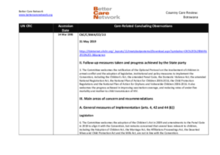Displaying 161 - 170 of 623
This study aims at analyzing adoption-related feelings, which include the feelings of loss and the ensuing curiosity about the birth family and pre-adoption life.
After almost five years of detailed research and analysis, the reports of the Permanently Progressing study (phase one) were published on 20 June 2019. The study investigated decision making, permanence, progress, outcomes and belonging for a large cohort (1,836 children) of all children in Scotland who became looked after in 2012-13, when they were aged five or under.
This report has been completed as one part of the study Permanently Progressing? Building secure futures for children in Scotland which heard directly from children about their experiences.
This report presents analyses of selected outcomes for Aboriginal and Torres Strait Islander children who live in households with members of the Stolen Generations.
There is little Australian research on the factors that influence decisions to adopt children from out‐of‐home care. This paper presents a mixed methods study that was conducted to address this gap.
This article examines how the Hague Convention on the Protection of Children and Co‐operation in Respect of Intercountry Adoption (Hague Adoption Convention) plays a central role in justifying the institution of legal adoption.
A study carried out in Italy based on a sample group of young immigrants (N = 168) and intercountry adoptees (N = 160) tests a model in which social (perceived discrimination) and family factors (parental autonomy support) predict psychological well-being.
This country care review includes the care-related Concluding Observations adopted by the Committee on the Rights of the Child.
This paper considers the importance of material objects for looked after and adopted children integrated as part of life story work practices.
This paper used the latest judgment documents from the court as a new data source, and identified the key nodes and trafficking paths by using a series of network indicators to enhance the public’s understanding of the crime mechanism of child trafficking.



